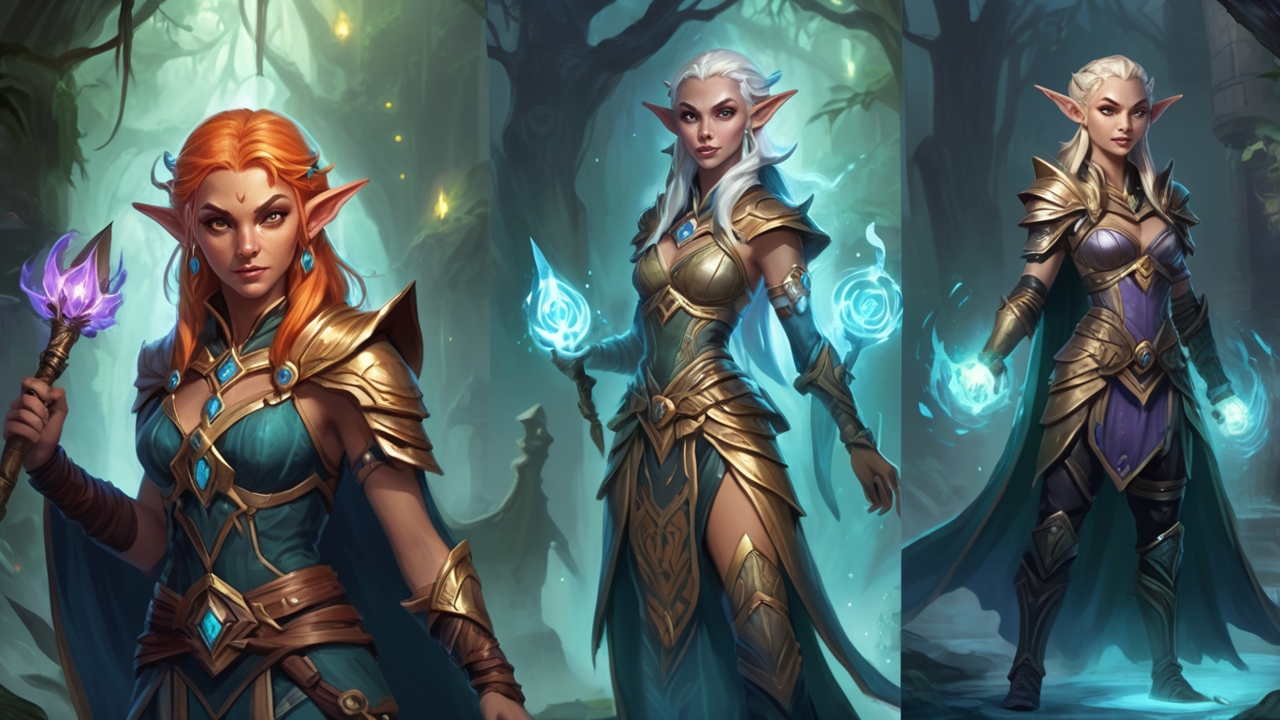The Sorcerer class in Dungeons & Dragons (DnD) is one of the most versatile and powerful spellcasting classes, drawing their magical abilities from innate power rather than study or divine favor. Sorcerers stand apart because they can manipulate the very fabric of magic with their signature Metamagic abilities, which let them shape spells in ways that other casters can’t. If you’re looking to build a powerful DnD Sorcerer capable of dealing massive damage, controlling the battlefield, and manipulating spells to suit your needs, you’ve come to the right place.
In this guide, we’ll cover everything you need to know about building a Sorcerer in DnD 5e, from choosing the right race and subclass to selecting optimal spells, feats, and metamagic options. Whether you’re a new player or a veteran looking to optimize your build, these tips will help you create a Sorcerer who’s not only fun to play but also devastatingly effective in any campaign.
Introduction to Sorcerers in Dungeons & Dragons
Sorcerers in Dungeons & Dragons are unique spellcasters who draw their magical power from within. Unlike wizards, who study ancient tomes to master the arcane arts, or clerics, who channel divine energy from their gods, sorcerers are born with an innate connection to magic. This raw, unfiltered power can stem from various sources—perhaps their bloodline is tied to dragons, or they were touched by a force from another realm. Whatever the origin, sorcerers have a natural affinity for casting certain spells, shaping the world around them with the sheer force of their will.
What makes DnD sorcerers particularly exciting to play is their ability to manipulate magic in ways other spellcasters cannot. Through their Metamagic abilities, sorcerers can customize their spells, altering how they work to suit their needs—whether that’s casting a spell silently, doubling its effect, or making it more difficult for enemies to resist. With fewer spells known but the ability to cast them with incredible flexibility, sorcerers excel at delivering devastating magical attacks, controlling the battlefield, and shaping reality itself. Whether you’re playing a noble descendant of dragons or a mysterious wielder of wild magic, a sorcerer’s connection to the arcane is as powerful as it is unpredictable.
Perks and Benefits of Playing a Sorcerer
Choosing to play a Sorcerer in Dungeons & Dragons offers a very different experience compared to other spellcasting classes like wizards, clerics, or warlocks. Sorcerers bring a unique combination of raw magical talent, flexibility, and customization that sets them apart. Here are some of the key perks and benefits of playing a Sorcerer, along with tips on how to think about the type of Sorcerer you want to create.
Innate Magic and Flexibility
Unlike wizards who must study their spells and prepare new ones each day, sorcerers have an innate connection to magic that allows them to cast a limited number of spells at will. While they don’t know as many spells as other casters, their spellcasting is more fluid. This comes from their signature ability: Metamagic.
- Metamagic allows you to manipulate your spells in creative ways, offering a level of customization no other class can match. Whether you want to cast a spell silently to avoid detection, hit two enemies at once with the same spell, or increase the range or potency of a spell, Metamagic gives you control over how your magic behaves. This means that a sorcerer can adapt to the needs of the moment, making them highly versatile in both combat and roleplaying situations.
- Sorcery Points, another core feature, fuel your Metamagic and can even be converted into extra spell slots or more powerful spells, giving sorcerers more flexibility in managing their magical resources. This resource-based system allows for spontaneity and bursts of magical power when needed, which can be a game-changer in tight situations.
Streamlined but Powerful Spellcasting
While sorcerers don’t have the sheer number of spells that wizards or druids do, what they lack in quantity, they make up for in power and adaptability. With fewer known spells, sorcerers tend to specialize more, honing in on a few key spells that they can use to devastating effect.
- Consistency: Sorcerers can cast the same spells repeatedly without needing to prepare new ones each day. This makes them more reliable in certain situations, as they always have access to their core spells, whereas wizards may need to prepare specific spells for different encounters.
- Direct Power: Sorcerers are built for combat-heavy encounters, often wielding damage-dealing spells like Fireball or Chromatic Orb with unmatched efficiency. Through Metamagic, they can turn a basic offensive spell into a deadly force, hitting multiple targets or making it harder for enemies to resist.
Sorcerer vs Other Casters
Sorcerers, wizards, clerics, and warlocks all bring different flavors to spellcasting, so it’s worth comparing the Sorcerer’s advantages to help you understand why you might prefer this class:
- Sorcerer vs Wizard: Wizards have more spells and can change their prepared spells each day, giving them unmatched versatility in terms of spell selection. However, sorcerers excel at spontaneous casting and customizing spells on the fly, making them more flexible in the heat of the moment. Wizards may have the academic knowledge, but sorcerers possess an instinctual mastery of magic.
- Sorcerer vs Warlock: Warlocks have powerful spells and unique abilities through their pacts with otherworldly entities. However, warlocks are limited by their pact magic system, which gives them fewer spell slots but refreshes more often. Sorcerers, on the other hand, have more spell slots and can modify their spells with Metamagic, giving them more room for magical creativity and sustained casting power.
- Sorcerer vs Cleric: Clerics are primarily support casters with access to healing and divine magic. While they can certainly deal damage, sorcerers shine when it comes to pure offensive spellcasting and manipulating the battlefield with raw magical power. A sorcerer can blast enemies from a distance, modify spells for maximum effect, and focus on area control in ways clerics typically cannot.

How to Build a Powerful DnD Sorcerer
When building a Sorcerer, the concept and backstory of your character can greatly influence their abilities and playstyle. Since sorcerers derive their magic from their very being, it’s helpful to think about where their magic comes from and how that shapes their personality, goals, and the way they approach magic.
Here are a few questions to help guide your character creation:
- What is the source of your magic? Sorcerers are defined by their magical origins, so think about what makes your character’s magic unique. Did they inherit their power from a draconic ancestor, or were they born under strange celestial circumstances? Are they a conduit for chaos, channeling uncontrollable wild magic? Knowing this can help you choose your Sorcerous Origin (subclass) and define their relationship with magic.
- How does your character feel about their powers? Do they embrace their magic as a gift, or do they view it as a curse they need to control? This can impact how they interact with other magic users and how they handle their abilities in dangerous situations. For example, a Shadow Magic Sorcerer might be mysterious and reserved, wary of their own dark powers, while a Draconic Bloodline Sorcerer might be confident and proud of their heritage.
- What is your character’s goal? Sorcerers often have personal reasons for adventuring, tied to their origins or their need to better understand and control their magic. Perhaps they’re seeking out ancient knowledge about their magical lineage, or maybe they’re on the run from those who fear their powers. Knowing your character’s motivations will give them depth and drive their decisions in-game.
By thinking through these concepts, you can build a DnD Sorcerer that feels distinct and personal. Whether you’re playing a noble heir of a dragon’s bloodline, a wild mage on the edge of chaos, or a psionic force of alien origin, your Sorcerer’s story and magic are deeply intertwined. The result is a character that doesn’t just sling spells but brings an engaging narrative and roleplaying depth to the table.
Now, let’s work through the actual process for creating your game character…
1. Choosing the Right Race
When building a Sorcerer in DnD, you’ll want to choose a race that complements your ability to cast spells, particularly those that enhance your Charisma score, which is your primary ability for spellcasting.
- Tiefling: Tieflings are one of the best races for Sorcerers because they receive a +2 bonus to Charisma. The Infernal Legacy trait also provides some useful extra spells, such as Hellish Rebuke and Darkness.
- Half-Elf: With a +2 Charisma boost and +1 to two other ability scores (which you can allocate to Constitution or Dexterity for better survivability), Half-Elves make excellent Sorcerers. They also get additional skills, which can help round out your character’s abilities.
- Aasimar: Aasimars also get a +2 bonus to Charisma, along with healing abilities through the Healing Hands trait and additional radiant damage, which fits perfectly into the role of a damage-dealing Sorcerer.
- Dragonborn: If you’re going for a Dragon-themed Sorcerer with the Draconic Bloodline subclass, Dragonborns get a +1 Charisma boost and thematic synergy through their breath weapon and resistance to elemental damage.
While these races are ideal for Sorcerers, any race that boosts Charisma or offers other benefits that align with your playstyle can work well.
2. Choosing a Sorcerous Origin (Subclass)
At 1st level, Sorcerers choose their Sorcerous Origin, which is their subclass. This decision shapes much of your Sorcerer’s abilities and flavor, so it’s important to choose one that complements your desired playstyle.
- Draconic Bloodline: This subclass grants an increased hit point pool and resistance to a damage type based on your dragon ancestor. It’s perfect for a Sorcerer who wants to be a little more durable while still dishing out elemental damage. You’ll also gain extra benefits like wings at higher levels, making this subclass both flavorful and powerful.
- Divine Soul: If you want access to healing spells while retaining the Sorcerer’s raw power, this subclass is for you. Divine Soul grants access to the Cleric spell list, making you a versatile caster who can heal allies or destroy enemies. You also get favored by the gods, a feature that allows you to add a boost to failed saving throws or attack rolls, giving you more survivability.
- Shadow Magic: For those who enjoy a darker, edgier Sorcerer, the Shadow Magic subclass offers unique abilities like the ability to summon darkness, teleport through shadows, and even resist death itself. You also gain darkvision, which is useful in many campaigns.
- Aberrant Mind: This is a great option for players who love psychic abilities and mind control. Aberrant Mind Sorcerers gain a suite of telepathic and psionic abilities, including access to additional spells like Detect Thoughts and Mind Sliver. The versatility of the subclass allows for both offensive and defensive playstyles.
Each subclass offers unique abilities that can shape your character’s playstyle, so choose one that aligns with your vision of the Sorcerer you want to play.
3. Maximizing Ability Scores
DnD Sorcerers rely on their Charisma for spellcasting, so it should always be your highest ability score. This affects your spell attack rolls, saving throw DCs, and the effectiveness of many key abilities.
- Charisma (Primary): Maximize this score as quickly as possible. It’s the backbone of your Sorcerer’s power.
- Constitution (Secondary): Since Sorcerers have limited hit points and often need to make concentration checks to maintain spells, Constitution should be your secondary focus. A higher Constitution means better survivability and a higher chance of maintaining concentration when taking damage.
- Dexterity (Tertiary): Dexterity helps with your armor class (AC), initiative, and some saving throws. While not as critical as Charisma or Constitution, it can help with staying alive longer.
Dumping Strength or Intelligence is common for DnD Sorcerers, as these stats don’t directly impact their effectiveness in casting spells or surviving in combat.

4. Choosing Metamagic Options
Metamagic is what sets Sorcerers apart from other spellcasters, allowing them to alter their spells for different effects. You can choose two options at level 3, and here are some of the best ones for maximizing your DnD Sorcerer’s power:
- Twin Spell: This is one of the most powerful Metamagic options, allowing you to target two creatures with a single-target spell for just a few Sorcery Points. It’s incredibly useful for buffing multiple allies with spells like Haste or Greater Invisibility, or attacking two enemies with Hold Person or Chromatic Orb.
- Quickened Spell: Casting a spell as a bonus action opens up a world of tactical options. You can cast a Fireball and follow it up with a cantrip like Fire Bolt in the same turn, maximizing your damage output.
- Heightened Spell: For spells that require saving throws, this option forces a target to have disadvantage on their first saving throw. It’s especially useful for big spells like Hold Monster or Dominate Person. So if your sorcerer is a mind control savant, use heightened spells to be harder to resist.
- Subtle Spell: While it’s not as flashy as other Metamagics, Subtle Spell can be a lifesaver when you need to cast a spell without drawing attention. It’s great for social interactions where spellcasting would otherwise be obvious or dangerous.
Choose Metamagic options that fit your playstyle. Some Sorcerers prefer to control the battlefield, while others focus on dealing damage—your choices should reflect how you like to approach combat and roleplay.
5. Selecting Spells
Ah, the real crux of what shapes the play style and effectiveness of your sorcerer. Their Chosen Spells.
Choosing the right spells is crucial for any DnD Sorcerer. As a Sorcerer, you have a limited number of known spells, and you’ll use these same spells repeatedly, so every choice should count. Here are some of the most powerful and versatile spells to consider for your arsenal:
Cantrips
- Fire Bolt: A reliable, long-range damage-dealing cantrip that scales with your level.
- Ray of Frost: Deals damage and reduces a target’s movement speed—perfect for controlling the battlefield.
- Mage Hand: Offers versatility and utility outside of combat, great for manipulating objects from a distance.
1st-Level Spells
- Shield: This spell provides a +5 bonus to AC when you need it most, making you harder to hit in combat.
- Magic Missile: Always hits, making it a great choice for dealing consistent damage without worrying about attack rolls.
- Chromatic Orb: Offers great versatility by letting you choose the damage type, making it easier to exploit enemy weaknesses.
2nd-Level Spells
- Mirror Image: Provides a great defensive buff that makes it difficult for enemies to hit you.
- Hold Person: Paralyze a humanoid enemy, taking them out of the fight and allowing for critical hits if they fail their save.
- Misty Step: A bonus action teleport that can save you from sticky situations or help you reposition for tactical advantage.
3rd-Level Spells
- Fireball: The iconic area-of-effect spell, Fireball deals massive damage and is a staple in every DnD Sorcerer’s spellbook.
- Counterspell: The ability to shut down enemy spellcasters is invaluable. Counterspell is one of the most versatile and powerful spells in the game.
- Haste: A fantastic buff that doubles a character’s speed, boosts their AC, and gives them an extra action.
4th-Level Spells and Beyond
- Greater Invisibility: Turn yourself or an ally invisible for powerful offensive and defensive options.
- Polymorph: One of the most versatile spells in the game, allowing you to turn a target into something harmless or into a powerful beast.
- Dominate Person: Take control of an enemy and turn the tide of battle.
Spell Selection Samples for Each Sorcerer Subclass
Choosing the right spells for your Sorcerer can help you embrace the unique flavor and strengths of your chosen subclass. Below are sample spell selections for each of the subclasses mentioned in the article, designed to reflect their distinct magical themes and provide powerful, effective spellcasting.
1. Draconic Bloodline Sorcerer
Theme: Power drawn from a draconic ancestor, with an emphasis on elemental magic, durability, and flying.
Key Strengths: Increased survivability (bonus hit points), resistance to an elemental damage type (based on dragon ancestry), and eventually gaining the ability to fly.
Cantrips:
- Fire Bolt (or another elemental damage type based on your draconic ancestry, e.g., Ray of Frost for a white dragon)
- Mage Hand
- Minor Illusion
- Prestidigitation
1st-Level Spells:
- Chromatic Orb (choose the element that matches your draconic ancestry)
- Mage Armor (to boost AC if not wearing armor)
- Burning Hands (great area-of-effect for early levels if your ancestry is fire-related)
2nd-Level Spells:
- Scorching Ray (themed for fire or elemental sorcerers)
- Mirror Image (adds survivability, since you’re often in the thick of combat)
3rd-Level Spells:
- Fireball (or another elemental spell that matches your ancestry, e.g., Lightning Bolt for a blue dragon)
- Fly (gain flight earlier than your subclass provides for added mobility)
4th-Level Spells:
- Elemental Bane (enhances your elemental damage spells)
- Greater Invisibility (stay protected while maintaining high damage output)
5th-Level Spells:
- Cone of Cold (if playing with cold/ice ancestry)
- Hold Monster (for powerful battlefield control)
2. Divine Soul Sorcerer
Theme: Blessed with divine magic, offering healing, support, and offense through a combination of Sorcerer and Cleric spells.
Key Strengths: Access to both Sorcerer and Cleric spell lists, making this subclass highly versatile. Can heal, buff, and deal damage all in one package.
Cantrips:
- Sacred Flame (cleric cantrip for radiant damage)
- Guidance (a great buff for ability checks)
- Spare the Dying (for emergency stabilization)
- Fire Bolt (for solid damage output)
1st-Level Spells:
- Cure Wounds (cleric healing spell)
- Bless (buffs your party for combat)
- Shield (for personal defense)
2nd-Level Spells:
- Lesser Restoration (healing utility)
- Spiritual Weapon (cleric spell for bonus action damage)
- Hold Person (paralyze humanoids)
3rd-Level Spells:
- Spirit Guardians (excellent battlefield control and damage)
- Counterspell (a must for defending against enemy casters)
- Revivify (bring a fallen ally back to life)
4th-Level Spells:
- Death Ward (prevent an ally from dropping to 0 HP)
- Banishment (remove a dangerous foe from the battlefield)
5th-Level Spells:
- Holy Weapon (cleric spell to turn an ally’s weapon into a radiant powerhouse)
- Greater Restoration (cure more severe conditions)
3. Shadow Magic Sorcerer
Theme: Magic drawn from the shadow realm, with a focus on darkness, necrotic energy, and survival against death.
Key Strengths: Shadow manipulation, resistance to death (via the Strength of the Grave feature), and teleportation through shadows.
Cantrips:
- Chill Touch (necrotic damage and prevents healing)
- Minor Illusion (useful for stealth and trickery)
- Mage Hand
- Toll the Dead (extra damage if the target is already wounded)
1st-Level Spells:
- Disguise Self (perfect for blending into the shadows)
- Shield (to increase survivability)
- Fog Cloud (create a zone of concealment)
2nd-Level Spells:
- Darkness (pair this with Devil’s Sight or use to obscure an area)
- Misty Step (for shadowy, quick repositioning)
- Shadow Blade (a thematic and powerful melee spell for shadow-based combat)
3rd-Level Spells:
- Counterspell (to shut down enemy casters)
- Fear (terrify enemies and send them fleeing)
- Vampiric Touch (drain life from enemies while dealing necrotic damage)
4th-Level Spells:
- Greater Invisibility (enhance your stealth and offensive capabilities)
- Phantasmal Killer (torment your enemies with nightmares)
5th-Level Spells:
- Cloudkill (create a deadly fog of poison)
- Wall of Force (create impassable barriers for battlefield control)
4. Aberrant Mind Sorcerer
Theme: Magic tied to psionic powers and otherworldly mental abilities, offering psychic damage and mind-altering spells.
Key Strengths: Telepathic communication, access to spells that deal psychic damage, and strong battlefield control through mind-affecting spells.
Cantrips:
- Mind Sliver (psychic damage with a debuff to saving throws)
- Message (perfect for telepathic communication)
- Mage Hand (for telekinetic manipulation)
- Prestidigitation
1st-Level Spells:
- Dissonant Whispers (psychic damage and forces the target to flee)
- Detect Thoughts (read surface thoughts and delve deeper into minds)
- Tasha’s Hideous Laughter (paralyze an enemy with uncontrollable laughter)
2nd-Level Spells:
- Hold Person (paralyze humanoid targets)
- Calm Emotions (pacify an aggressive crowd)
- Mirror Image (adds survivability in combat)
3rd-Level Spells:
- Hypnotic Pattern (immobilize enemies in a mesmerizing display)
- Counterspell (for shutting down enemy spells)
- Enemies Abound (turn a target’s mind against its allies)
4th-Level Spells:
- Greater Invisibility (turn invisible while casting offensive spells)
- Evard’s Black Tentacles (summon psychic tendrils to restrain and damage enemies)
5th-Level Spells:
- Synaptic Static (a psychic bomb that damages and debuffs enemies’ mental faculties)
- Dominate Person (take control of an enemy’s mind)
Each Sorcerer subclass offers a unique blend of spellcasting that reflects their origins and magical themes. Whether you’re blasting foes with elemental power, controlling minds with psychic abilities, summoning shadows, or healing allies with divine magic, your spell selection plays a critical role in making your Sorcerer both thematically consistent and powerful in combat. By focusing on spells that enhance your subclass’s strengths, you can create a Sorcerer that’s not only fun to roleplay but also highly focused and effective on the battlefield.
6. Feats and Other Options
As a Sorcerer, you want to increase you Charisma as quickly as possible but you don’t get many ability score improvements, so choosing the right feats is important. Some of the best feats for Sorcerers include:
- War Caster: This is one of the best feats for any caster. It gives you advantage on Constitution saving throws to maintain concentration, allows you to cast spells as opportunity attacks, and makes spellcasting with a weapon or shield easier.
- Elemental Adept: If you tend to focus on a specific element like fire or cold, this feat lets you ignore resistance to that damage type and treat 1s as 2s on your damage rolls.
- Resilient (Constitution): This feat gives you proficiency in Constitution saving throws, which helps you maintain concentration on spells.
Getting Ready for Battle
Building a powerful Sorcerer in D&D is all about maximizing your Charisma, choosing the right subclass, and carefully selecting spells and Metamagic options that fit your playstyle. By focusing on flexibility, high damage output, and tactical use of spells, you’ll be able to control the battlefield, deal devastating damage, and support your party in any situation. Whether you’re raining down fireballs or manipulating the very essence of magic with Metamagic, your Sorcerer will be a force to be reckoned with in any campaign.
For more information on building great DnD Characters, explore our whole category on Character Builds.








